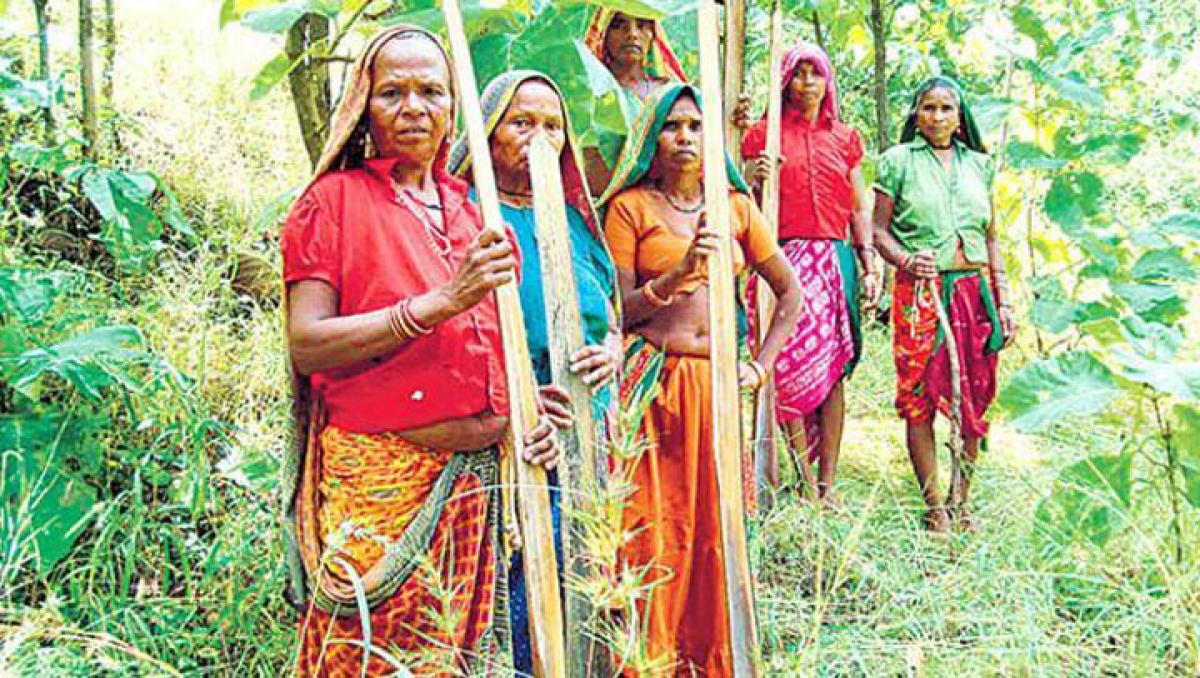Live
- A Guide to Temperature and Humidity Standards in Data Center Server Rooms
- Gadwal collector briefs on details of voters
- Jupally Krishna Rao takes part in Alampur rallu
- Bharath Prasad files 3rd Nomination
- Baisakh Month: A Time of Auspicious Beginnings and Sacred Festivals
- Oust BJD govt for overall development, says Shah
- Unveiling the Hidden Gems: Surprising Health Benefits of Garlic Peels
- Overcoming Sleep Struggles: A Comprehensive Guide to a Restful Night
- RTC bus hit the auto
- MLA Kuchukula Rajesh Reddy participated in the Birappa festival
Just In

For as long as she can remember, Panchi Sahariya and those in her tribal community in central India have been threatened, harassed, beaten and even arrested for living on land which does not legally belong to them.
New Delhi : For as long as she can remember, Panchi Sahariya and those in her tribal community in central India have been threatened, harassed, beaten and even arrested for living on land which does not legally belong to them. But there is nowhere else to go, she says. For over 40 years, the forest village of Nibheri in Madhya Pradesh state has been home to 150 families of the Sahariya tribe and their children have been born and brought up there.
"We have no land of our own. We had no choice but to live in the jungle. We survive from the little farming we do there. But there is no comfort, there is no security," she said. "The forest department guards come and threaten us and tell us to move. Sometimes they have even beaten us and taken our people to jail for protesting over the land."
Sahariya is one of more than 5,000 people from India's most impoverished communities who gathered in the capital this week to demand Prime Minister Narendra Modi bring in a law guaranteeing the rural poor the right to shelter. Despite wide recognition of the link between poverty and landlessness in India, and a slew of policies over the years aimed at helping the people secure housing, more than half of rural Indians do not have a permanent homestead.
Data from India's 2011 Socio Economic and Caste census released last year showed that 100 million families, that is 56 percent of all rural households, were landless. Most are from low caste or indigenous communities, who have faced decades of neglect and social discrimination, and continue to live on the margins of society – partly due to a failure to enforce laws aimed at their uplift.
Social indicators such as infant and maternal mortality rates, literacy and monthly income are worse than national averages and their access to quality services such as good hospitals and schools remains a serious challenge. Homestead bill neglected After years of campaigning for land rights by the social movement Ekta Parishad which has organised multiple rallies involving thousands of homeless rural poor the government drafted legislation in 2013.
The National Rural Homestead Bill calls for a democratic and market-friendly land reform programme, providing landless families with plots of land the size of small football fields. The bill provides that titles for the land, which would be around 4,400 square metres, be registered in the name of the woman, rather than jointly by the male and female head of the household.
To ensure accountability of the local authorities, it also stipulates a time frame of five years for India's 29 states and seven union territories to enforce the law. But the draft bill has never been presented before parliament, despite repeated promises by both the previous and current government to introduce it to lawmakers.
Activists acknowledge that land reform, like in many other countries, is a highly political issue but argue that securing tenure for the landless will help stem the rapid and uncontrolled urbanisation India currently faces. India's towns and cities are projected to swell by an additional 404 million people by 2050, as villagers migrate to urban areas in search of opportunities and better standard of living, says the United Nations.
More significantly, experts say, land in India is the biggest predictor of poverty. Insecurity traps people in extreme impoverishment, restricts economic growth, and sparks conflict. "When women and men gain secure rights to land, they can begin investing in their land to improve their harvests and their lives," says the land rights group, Landesa. "Further, land rights in India act as a gateway right.
When women and men gain secure rights to land, they can access a host of government services from work and nutrition programmes to agricultural extension services." Research by Landesa suggests clarifying and strengthening land rights could increase India's GDP by as much as 476 billion rupees ($7 billion).
By Nita Bhalla

© 2024 Hyderabad Media House Limited/The Hans India. All rights reserved. Powered by hocalwire.com







